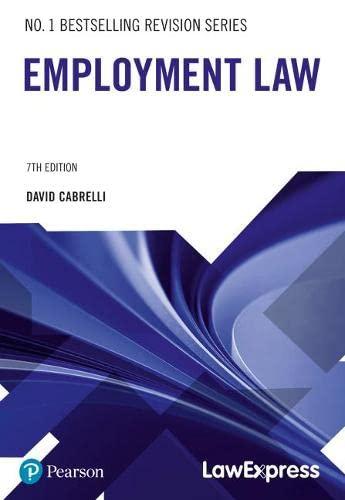Question
I was assigned a valuation of the shares of a pharmaceutical laboratory. Which valuation method is more convenient? 2.I need to know how to value
I was assigned a valuation of the shares of a pharmaceutical laboratory. Which valuation method is more convenient?
2.I need to know how to value a company well, but I cannot clearly see the valuation process of a company starting from its past income statements. What are the systematical steps I need to take? Firstly , I think I should elaborate the provisional statements for the following fiscal years and then calculate the cash flows, discount them at the present moment (with a discount factor), add the terminal value to it and the difference between the book net value and the market value of intangibles. I really need that these steps be methodical and easy to understand so I can use them as a guide when valuing a company.
3.What is a 3 * 1 Split?
4.A court assigned to me (as an economist and auditor) a valuation of a market butcher's. The butcher's did not provide any simple income statements or any valuable information which could be used in my valuation. It is small business with just two employees, the owner and an apprentice. This type of tax system exempts them of certain commercial and fiscal informative statements. I think it is very important to underline that the object of the valuation is not a company, but rather a business, a work position. Although it has recurrent customers the value of its tangible assets is solely the value of its tools, as the premises are rented (I think it is impossible to value the tangible assets that is the work). Obviously, discounting cash flows in not an appropriate method in this case. Actually, I don't know which profession fits better the job that the court assigned to me.
5.What repercussions do variations in the price of oil have on the value of a company?
6.How can auditor spot acts of creative accounting? I mean, for example the excess of provisions or the non-elimination of intra group transactions with value added.
7.I heard talk of the Earnings Yield Gap ratio, which is the difference between the inverse of the PER and the TIR on 10-year-bonds.It is said that if this ratio is positive then it is more advantageous to invest in equity. How much confidence can an investor have in such an affirmation?
8.I have a doubt regarding the Enron case. How could such a prestigious investments bank advice investing when the quotations of the shares were falling?
9.Is the following affirmation of an accountancy expert true? "The valuation criterion which reflects the value of the shares of a company in the most accurate manner is based on the amount of the shareholder's equity of its balance sheet. Stating that the value of a company's shares equals its book value is a valid argument."
10.Could we say that goodwill is equivalent to brand value?
11.Could we say that the value of shares is intangible?
Step by Step Solution
There are 3 Steps involved in it
Step: 1

Get Instant Access to Expert-Tailored Solutions
See step-by-step solutions with expert insights and AI powered tools for academic success
Step: 2

Step: 3

Ace Your Homework with AI
Get the answers you need in no time with our AI-driven, step-by-step assistance
Get Started


